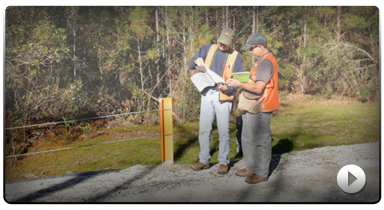 Agency coordination is an essential part of the Corps of Engineers regulatory program. The Corps coordinates with other federal and state agencies to ensure that permits are processed in accordance with related state and federal laws.
Agency coordination is an essential part of the Corps of Engineers regulatory program. The Corps coordinates with other federal and state agencies to ensure that permits are processed in accordance with related state and federal laws.
This page explains two of the most common state agency programs that the Corps coordinates with when processing a permit application, a "401 certification" issued by the state under their water quality laws, and a "CAMA permit" issued for "areas of environmental concern" in the coastal counties.
Clean Water Act, Section 401 Certification
North Carolina uses the authority granted to them under the Clean Water Act (CWA) Section 401 certification to manage certain activities that impact their wetland and water resources.
If the U.S. Army Corps of Engineers determines that a 404 Permit is required because your proposed project involves impacts to wetlands or waters, then a 401 Water Quality Certification is also required. The NC Division of Water Resources, Water Quality Permitting Section reviews and issues Water Quality Certifications that mirror the type of Corps permit that is required for your work, that is, a Nationwide, Regional, General or Individual Permit. For each of the Nationwide, Regional or General Permits, a matching General Certification must be issued by DWQ in order for the Permit to be valid.
The NC Division of Water Resources, Water Quality Permitting Unit posts the current NC DWQ 401 Certification Requirements for the Corps of Engineers Nationwide and General Permits, and for Individual Permits, contact NC DWR for information on Certifications required for the Individual Permit process.
In North Carolina, for nationwide permits, you use a single form to request both a 404 Permit and 401 Certification. This requirement is fulfilled by using the joint pre-construction notification form PCN Form can be downloaded directly. There are instructions on the form.
Section 401 gives the States the authority to grant, deny, or condition certification of Federal permits or licenses (e.g., CWA Section 404 permits issued by the U.S. Army Corps of Engineers, Federal Energy Regulatory Commission licenses, some Rivers and Harbors Act Sections 9 and 10 permits, and CWA Section 402 permits where issued by EPA) that may result in a discharge to "waters of the U.S." Such action is taken by the State to ensure compliance with various provisions of the CWA. Violation of water quality standards is often the basis for denials or conditioning through Section 401 certification. Water quality standards are an effective tool available to States to protect the overall health of their wetlands resources and the valuable functions they provide, including shoreline stabilization, non-point source runoff filtration, wildlife habitat, and erosion control, which directly benefit adjacent and downstream waters. Water quality standards, including designated uses, criteria, and an anti-degradation policy can provide a sound legal basis for protecting wetland resources through State water quality management programs.
Learn more about 401 Certifications in North Carolina: (link exits Corps web site to NC DWR)
Coastal Zone Management Act, Federal Consistency
For some permits in the coastal counties, a "CAMA consistency determination" must also be obtained in conjunction with obtaining the Corps permit. CAMA is the authority for the state agency, the Division of Coastal Management, that implements the Coastal Area Management Act and the Coastal Zone Management Act for North Carolina.
The Coastal Zone Management Act (CZMA) is the Congressional plan for managing America's coasts. It was enacted to encourage the participation and cooperation of state, local, regional, and federal agencies and governments affecting the coastal zone. The CZMA is the only environmental program that requires a balance between economic development and resource protection within the coastal zone.
The act allows states to develop a Coastal Zone Management Plan (CZMP) in which they define permissible land and water use within the state coastal zone. This coastal zone extends 3 miles seaward and inland as far as necessary to protect the coast.
The federal consistency requirement of the CZMA (as outlined in Section 307) requires that federal actions that are likely to affect any land or water in the coastal zone must be consistent with the state's coastal management program.
States use the consistency requirement to address effects on coastal uses or resources that are the result of federal actions. Federal actions include federal agency activities, federal approval activities, and financial assistance activities.
This "effects test" also includes reasonably foreseeable effects in the coastal zone that could occur from activities conducted outside of the coastal zone.
Learn more about North Carolina's program, the Coastal Area Management Act, and Consistency Determinations by NC Department of Coastal Management (DCM). (exit Corps web to NC DCM)